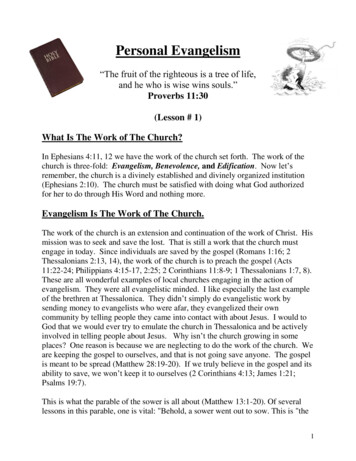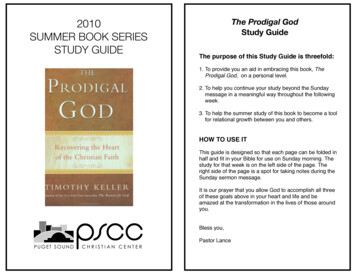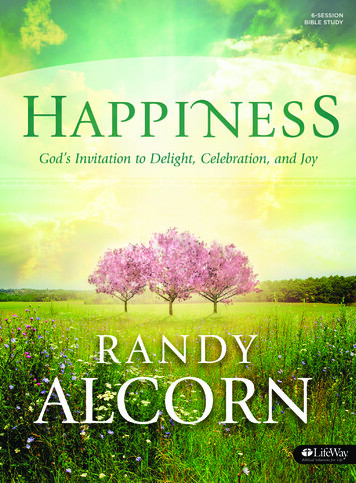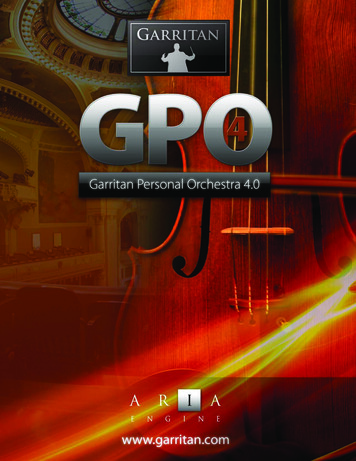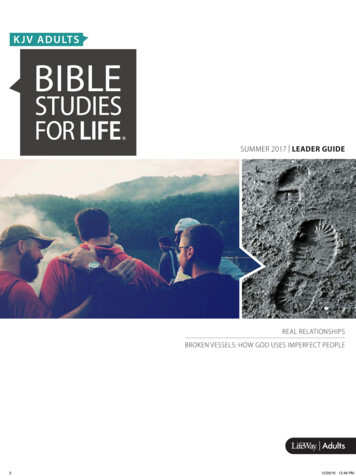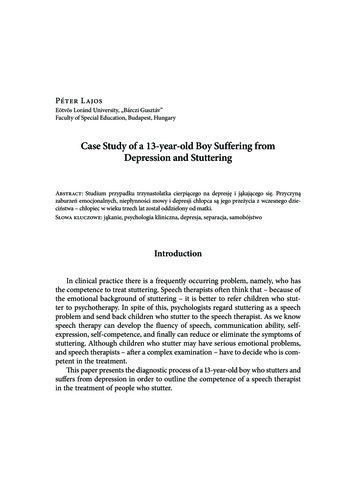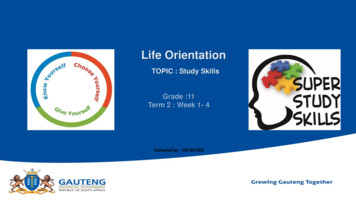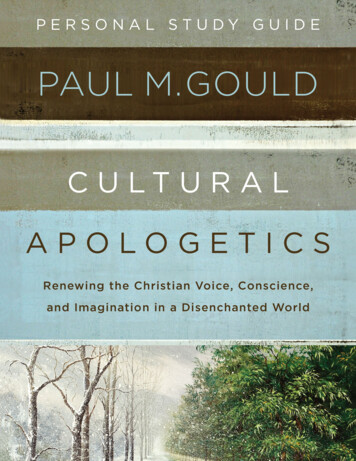
Transcription
PERSONAL STUDY GUIDE
Chapter 1WHAT IS CULTURAL APOLOGETICS?“If a genuine missionary encounter between Christianity and Western culture were to happen, and thechurch could bridge the gap by pointing to the truth, goodness, and beauty the culture longs for, I believe it wouldlead to the reestablishment of the Christian imagination, mind, and conscience.” (pg. 34)SCRIPTURE READING:Acts 17:22-34REVIEW QUESTIONS:1. What is “cultural apologetics”? (21)2. What are the problems that the cultural apologist is responding to? (18-19)3. What are the two “levels” that the cultural apologist must operate in? (22)4. What is the model of cultural apologetics developed in this book (built on Paul’s example at MarsHill in Acts 17)? (23-27)5. What is hoped to be achieved by the cultural apologist? (34)
3P E R S O N A L ST U DY G U I D EC H A P T E R 1 : W H AT I S C U LT U R A L A P O LO G E T I C S ?DISCUSSION QUESTIONS:1. How is cultural apologetics different than apologetics as we normally understand it?What are your thoughts concerning the posture of the cultural apologist?2. How are you understanding your culture (“your Athens”) and the cultural shifts? How does yourculture perceive the world? How does your culture think? How do those in your culture live?3. Is it true that Christianity and the church suffers from an image problem? Do you think that theChristian voice, conscience, and imagination has been muted in your culture? If so, in what ways?4. The two tasks of the cultural apologist is to show Christianity as reasonable and desirable. What doyou think are some reasons why Christianity is no longer viewed as reasonable or plausible? What aresome reasons why Christianity is no longer viewed as desirable?5. How can we have genuine missionary encounters with those in our culture? What steps could weimplement to help others see Christianity as both reasonable and desirable? How can we help otherssee Jesus Christ as good, true, and beautiful?PRAYERFather,Goodness, truth, and beauty are what all of our hearts desire and they find their ultimate culmination in you.As cultural apologists, our task is to help others see this reality, but we also know that this can only be accomplishedthrough the work of the Holy Spirit. So, we ask that you use us and empower us to reestablish the Christianimagination, mind, and conscience in our culture so that the lost may return home to you. Amen.
4P E R S O N A L ST U DY G U I D EC H A P T E R 1 : W H AT I S C U LT U R A L A P O LO G E T I C S ?PERSONAL REFLECTION:Ask yourself and reflect on the question: “What do you make of Jesus?” Do you view Jesus as a person ofsupreme goodness? Do you view Jesus as brilliant, a person of wisdom, and an expert in all matters? Doyou view Jesus as beautiful and worthy of worship? Before you can help others see Jesus as good, true, andbeautiful, you must first possess that proper attitude towards Christ.
Chapter 2DISENCHANTMENT“For in the gospel we find an enchanted, supernatural world where love is eternal,death is cheated, victory is snatched out of the hands of defeat, and all turns out for the good in the end.The world, if we pay attention, points to God and a God-bathed reality.” (pg. 65)SCRIPTURE READING:Matthew 6:22-23REVIEW QUESTIONS:1. There are two ways of perceiving the world – a disenchanted way and an enchanted way.What is meant by these two ways of perceiving? (37-40)2. Two people can look at the same object, events, or evidence and see and understand it differently.Why is this so? (40)3. What is the proposed model of re-enchantment? (41-45)4. What are the four characteristics of disenchantment? Please explain. (52)5. What are the five signs of transcendence? Please explain. (63-65)
6P E R S O N A L ST U DY G U I D ECHAPTER 2: DISENCHANTMENTDISCUSSION QUESTIONS:1. Do you think your culture has a disenchanted perception of the world? Has it suppressed the truth of Godand emptied the world of the supernatural? If so, what factors do you think led to this disenchantment?2. Do you see the disenchantment in the lives of Christians? In the church? Has disenchantment crept intoyour own perception of the world?3. We are told by the “Reality Police” – the elite groups of university professors, journalists, Hollywoodproducers, lawmakers, and others who try to define reality for the rest of us – that transcendence has beendeclared “inoperative.” Discuss the pressing problems for these “official reality-definers” who want topush their secular and materialistic agendas. How can cultural apologists respond?4. Do you think re-enchantment is possible? How so? What might this look like? How can we join God andothers to work to re-enchant the world?5. Part of the task of the cultural apologist is to help reawaken the universal and natural human desires andredirect them toward their proper end. What are these longings and how can be carry out this task?PRAYERFather,You have created the world beautifully and everything bears your sign – the grandeur of heaven is on display, if wehave eyes to see; the music of heaven sings praise to you, if we have ears to hear; the aroma of heaven invites us to afeast, if we have the nose to smell. We ask that you will awaken those under the spell of disenchantment to see thesigns of transcendence in your created order. Reawaken us to see creation in its proper light – as sacred, holy, and agift from you, our Creator. Amen.
7P E R S O N A L ST U DY G U I D ECHAPTER 2: DISENCHANTMENTPERSONAL REFLECTION:Everything that exists – every truth discovered, every beauty, and every good – points to and illuminatesthe Divine. How can you safeguard yourself from slipping into disenchantment? How can you beginto view the seemingly mundane as sacred and beautiful? Reflect on the signs of transcendence in your“ordinary” life.
Chapter 3REENCHANTMENT“People question the goodness of God, the attractiveness of the church, the beauty of Jesus, and the sufficiencyof the gospel to meet human needs and the longings of the heart. A cultural apologetic of return calls the churchto see and delight in the ever-present, all-consuming Creator, Sustainer, and Redeemer.” (pg. 92)SCRIPTURE READING:Psalm 63REVIEW QUESTIONS:1. As cultural apologists, we will encounter three types of people; who are they and whatcharacterizes them? (68-69)2. What are the three ways we can join the Holy Spirit in awakening the deep desires of the heart inthose we seek to reach with the gospel? Please explain. (72)3. What is the argument from desire? Is it a successful argument? What is the objection from evolutionarypsychology? Is it successful? (75-79)4. What are the steps to “returning to reality”? (82)5. What are three false re-enchantments mentioned in this chapter? What makes these views false? (86-91)
9P E R S O N A L ST U DY G U I D ECHAPTER 3: REENCHANTMENTDISCUSSION QUESTIONS:1. “[Human beings] are creatures driven by our longings and loves. We are desiring animals” (67). Whatdoes this mean? How does this understanding affect the way we engage others as cultural apologists?What are the proper desires we ought to have? Discuss the traditional understanding of love as atheological virtue.2. Do you believe the human heart has been furnished with the universal longing for God? Reflect on theargument from desire. If so, why do you think many are unaware of this deep longing? Why has thisuniversal longing for transcendence gone unnoticed or suppressed by many today?3. Disenchantment redirects and channels man’s desires toward the mundane. How have you seen thisplayed out in culture? In your churches? In your life?4. Reflect back on the three ways the Holy Spirit reawakens the human heart and redirect it Godward –the way of the imagination, the way of reason, and the way of morality. Which way is the primary meansof awakening your desire for the Divine?5. How can we begin to see the world as God-bathed, full of wonder and delight? How can we collectivelyencourage each other and invite others to see the world as sacred and holy?PRAYERFather,In re-enchanting the world, the Holy Spirit is turning the world right-side up, and the “righting” of this worldbegins by reawakening our deep desires. We ask that you will enable us to see our desires more clearly and re-orderour loves to keep you first and foremost. Allow us to view you as our supreme good, so that we may draw others tosee reality in the same way. Amen.
10P E R S O N A L ST U DY G U I D ECHAPTER 3: REENCHANTMENTPERSONAL REFLECTION:Reflect on the deepest longings of your heart. Are they for God and his glory? Do you see God as thesupreme beauty and your supreme good? Ask the Holy Spirit to daily prompt your heart to long for Godthrough imagination, reason, and conscience.
Chapter 4IMAGINATION“Beauty awakens our longings, and the imagination paints pictures in our mind that help us see reality more clearly Art has an ability to bypass our defenses and touch our identity in a way that nothing else does.” (pg. 97)SCRIPTURE READING:Exodus 31:1-11REVIEW QUESTIONS:1. As cultural apologists, we need to bring back an appreciation for beauty into the church. What were thethree reasons that led the church away from the appreciation of beauty and art? Please explain. (98-99)2. “Does God care about art? Does he utilize beauty? Does he seek to engage our imagination? Scriptureanswers with a resounding yes!” (102). Where in Scripture could we turn to for the answer? How can weshow others this reality through the use of Scripture? (100-105)3. What is the imagination? What is its role in cultural apologetics? (106-110)4. How can stories be utilized by the cultural apologist? What role do stories play in engaging one’simagination? (112-113)5. What are three practical things Christians can do as a means to utilize art, beauty, and the imagination topoint others to Jesus? (114-116)
12P E R S O N A L ST U DY G U I D EC H A P T E R 4 : I M AG I N AT I O NDISCUSSION QUESTIONS:1. Why do you think the use of the imagination and beauty is important in apologetics (especially in adisenchanted age)?2. What is beauty? Do you possess a proper theology of beauty? Or do you fail to understand what beauty is,or fail to understand its purpose or origin? In what ways has culture fallen into confusion when it comesto what beauty is?3. Prior to reading this chapter, did you view God as a Master Artist – a God who uses art and beauty toattune our hearts to him? How has your view of God and his creative work changed?4. What are some stories that have impacted your life? What was it about these stories that captivated youand left an impression? “Good stories are good precisely because they point to the one true story of theworld: the gospel” (113). How can we, as cultural apologist, use stories or narratives to share the goodnews of Jesus?5. What is the role of art and media in cultural apologetics? How can we partner with artists to promote,cultivate, and create that which is beautiful? How can art become a medium to share the beauty of Christ?PRAYERFather,You are the Master Artist. You not only create that which is beautiful, but you are the fullness of beauty itself.Beauty – in nature, art, humans, and the sacred – awakens within us a longing for you. You use beauty to rousea disenchanted world so give us the eyes to see the beautiful in the “mundane”. You use beauty to beckon us home,so give us the ability to recognize and respond appropriately. Amen.
13P E R S O N A L ST U DY G U I D EC H A P T E R 4 : I M AG I N AT I O NPERSONAL REFLECTION:“Regardless of your own artistic ability (or lack thereof), Christians are called to be creators and cultivatorsof the good, true, and beautiful the things we make – omelets, outfits, sermons, bridges, buildings, cars,movies, stories, blog posts, tweets, paintings, PowerPoint presentations, photos, research papers, moviereviews, furniture, landscapes – we should make with beauty in mind.” (105). How can you use your giftings– artistic gifting, musical gifting, storytelling gifting, etc. – to bring beauty back into your everyday life andin the lives of those around you? How can you lead others to see and recognize beauty as aids to worship?
Chapter 5REASON“God has given us reason as a guide on this journey to help us discover truth and its source.As cultural apologists, we want to help others see and understand the value of reason andthen look along the path of reason on our quest for Jesus and the gospel” (pg. 127)SCRIPTURE READING:Proverbs 19:2REVIEW QUESTIONS:1. The Western mind and culture has been imbued with a spirit of anti-intellectualism. What has caused this“dumbing down” of our culture? (120)2. A common objection against Christianity is the argument that belief in God is unreasonable. Whatmotivates atheists to make such bold claims? What are some of their arguments? Do they provide a betteralternative? (121-122)3. How can we know something is true? By what process do we utilize our reason to arrive at truth? (128)4. What is the argument from reason? What are the four features of rational inference? (130-137)5. What is and is not the ultimate goal of the cultural apologist’s use of reason and arguments? (142)
15P E R S O N A L ST U DY G U I D ECHAPTER 5: REASONDISCUSSION QUESTIONS:1. Do you believe that the Christian faith measures up to the standards of reason? The standards of truth?Why or why not?2. Reflect back on the argument from reason. Discuss how, given the four features of rational thought, theexistence of minds is better explained in a theistic framework rather than a naturalistic framework. Whatare the shortcomings of a naturalistic worldview?3. Identify possible starting points when presenting a case for Jesus and the gospel. How can you develop acase for Christianity from this starting point? Remember, when identifying a starting point, it is necessaryto take into consideration a plausibility structure along with the sacred core of an individual (or group ofindividuals). Practice presenting a case for Christ by engaging in an experimental dialogue with one another.4. “Becoming an effective case-maker takes time, study and practice, but it is part of what it means to followin the footsteps of Jesus and the disciples, all of whom gave arguments, reasons, and evidence for theirpositions” (142). How can Christians collectively encourage and engage with one another to become betterprepared to be a more faithful witness for Christ by showing Christianity as true to the way the world isand true to the way the world ought to be? How can we recover the art of Christian persuasion? Whatsteps can churches take in promoting the intellectual flourishing of their members?PRAYERFather,We are living in a world that claims belief in God is unreasonable. However, we understand that faith is not a blindleap into the abyss of irrationality. You have left an abundance of evidence –as divine signposts, or fingerprints – inthe created order and have furnished us with the capacity to reason our way to discover the truth and the Source of alltruth. Allow us to properly utilize the gift of reason as we seek to know more of you and your Son, Jesus Christ. Amen.
16P E R S O N A L ST U DY G U I D ECHAPTER 5: REASONPERSONAL REFLECTION:Ask yourself, “Am I able to make an effective case for the reasonableness of Christianity?” Our job ascultural apologists is to understand those we seek to reach and to present our case in truth with love.Are you in a position to carry out that task? If not, read an apologetics book, or attend an apologeticsconferences, or maybe even take an apologetics class! Use whatever means you can; ask yourself, “Whatcan I do to grow in my knowledge of the Lord and become a better witness for Christ?”
Chapter 6CONSCIENCE“The longing for wholeness, justice, and significance are three aspects of a universal longing forgoodness found within the human heart. As cultural apologists, part of our task is to partner withthe Holy Spirit in awakening thing longing for goodness. We do this by pursuing the one who isperfectly whole, the source of justice, and the fount of meaning.” (pg. 157)SCRIPTURE READING:1 Peter 2:1-12REVIEW QUESTIONS:1. For Christianity to be viewed as desirable, what must Christians begin to do? (147)2. Humans possess the universal longing for goodness. This quest for goodness finds its expression in threesub-longings. What are they? Please explain. (149)3. What is the moral argument for God? Consider the objections. Do you think the moral argument is agood argument? (157-163)4. What were the two reasons given for why Christianity is good? Also, in what ways does Christianitymake this world more inviting, more delightful, and more flourishing than a world without it? (164-166)5. How can Christians go “deep” in our culture, penetrating into the social and ideational structures ofculture so that the gospel will be viewed as reasonable and desirable? (169)
18P E R S O N A L ST U DY G U I D EC H A P T E R 6 : CO N S C I E N C EDISCUSSION QUESTIONS:1. Christianity and the church suffers from an image problem. If the church is compromised and nominal,how might Christianity be seen as good to those outside the church? Is it possible for our culture to transitionfrom seeing the church as hostile and hypocritical to the beautiful bride of Christ? If so, how might this be done?2. Concerning the longing for wholeness, how do you see fragmentation in your own life? Where do you seefragmentation in the culture? Where does our longing for wholeness come from? And how can we bemade whole again?3. “Why does God allow pain and suffering?” The question of why God allows evil reveals a deep longingfor a world made right. How does Jesus and the gospel story give us hope in the midst of the injustice inthe world? How can Jesus and the gospel story give you hope in the midst of the trials you undergo?4. “Christians throughout history have been a large part of the efforts to abolish slavery, improve health care,meet the needs of the poor, establish equal rights for minorities and women, and champion the arts” (166).Well, what can we do now – as individuals and as the church– to make a positive difference in the world today?5. We all long to be a part of a story greater than the ones we can create. We long for a story of significance,where we can locate our lives and find meaning. How can we locate our lives in the gospel story? Howcan we find of significance? How can you live a life of cultural impact right now, right where you are?PRAYERFather,We understand that Christianity is good for the world because in Christianity we get Jesus, and when we have Jesus, wehave everything we could ever need. Through Jesus and the gospel, we become a part of a story that fills our lives withmeaning, hope, significance, and wholeness. Allow us, as cultural apologists, to constantly remind those around us ofyour goodness and invite others to become a part of the greatest story ever told. Amen.
19P E R S O N A L ST U DY G U I D EC H A P T E R 6 : CO N S C I E N C EPERSONAL REFLECTION:We can make a positive impact in our cultures by faithfully taking up the vocation God has called us toand living missionally. Reflect on what vocation God has called you to – remember, you do not need to be inChristian ministry to be in faithful service to God. Whatever it is that God has called you to – engineers,cashiers, students, bank tellers, truck drivers, educators, etc. – faithfully take up the calling and flourishwhere you are. How can you lead a missional life where you are right now? How can you rekindle theconscience of those around you and direct them toward the source of all goodness?
Chapter 7ADDRESSING BARRIERS“The cultural apologist should help seekers overcome barriers so that the seeker can genuinely considerthe question of Jesus as an attractive possibility. The tools of the cultural apologist are many, offeringmultiple points of entry and contact with these barriers What we cannot do, however, is ignore them ifwe want others to see and understand Jesus as their only hope and greatest need.” (pg. 200).SCRIPTURE READING:Proverbs 18:17; 2 Corinthians 10:5REVIEW QUESTIONS:1. What are some of the greatest obstacles to the reception of the gospel? (172)2. What are the distinctions between interior barriers and external barriers to Jesus and the gospel? (172)3. What are the chief internal barriers to Jesus and the gospel? How can we overcome these barriers?Please explain. (172-182)4. What are the chief external barrier to Jesus and the gospel? How can we respond to these barriers?Please explain. (182-198)5. In addressing barriers, what is the cultural apologists ultimate aim? (200)
21P E R S O N A L ST U DY G U I D ECHAPTER 7: ADDRESSING BARRIERSDISCUSSION QUESTIONS:1. Reconsider the internal barriers to Jesus and the gospel. Which internal barrier presents the most difficultobstacle for you to overcome? Why?2. Which internal barrier do you think is most prevalent in the church? How can we work together to overcome this barrier?3. Reconsider the external barriers to Jesus and the gospel. How many of these barriers have you personallyencountered – whether at school, at work, in your home, etc.?4. Which external barrier did you find the most difficult to address prior to reading this chapter? Do youfeel like you can adequately address the barrier now? Practice responding to an external barrier byengaging in an experimental dialogue with one another.5. What are other barriers, internal or external, that you can think of? Collectively reason and think throughthese barriers in a safe place.PRAYERFather,In a disenchanted age with false ideas and disordered loves, there are many great obstacles to the reception of yourglorious gospel. As cultural apologists, our task is to “destroy arguments and every lofty opinion raised against theknowledge of [you]” (2 Cor. 10:5). Our desire is to remove any and all barriers hindering others from seeing you as thesource of all that is good, true, and beautiful. Grant us the wisdom and a posture of love to draw others to you. Amen.
22P E R S O N A L ST U DY G U I D ECHAPTER 7: ADDRESSING BARRIERSPERSONAL REFLECTION:We can make a positive impact in our cultures by faithfully taking up the vocation God has called us toand living missionally. Reflect on what vocation God has called you to – remember, you do not need to bein Christian ministry to be in faithful service to God. Whatever it is that God has called you to – engineers,cashiers, students, bank tellers, truck drivers, educators, etc. – faithfully take up the calling and flourishwhere you are. How can you lead a missional life where you are right now? How can you rekindle theconscience of those around you and direct them toward the source of all goodness?
Chapter 8HOME“We all have a sense of what home ought to be. Home is the place where you belong. It is a place whereyou are fully known and fully loved and where your identity is forged and your purpose discovered Home is an apt metaphor for our hearts deepest longing – for God, wholeness, meaning, and purpose;a place and path where life is experienced as it was meant to be.” (pg. 204-205)SCRIPTURE READING:2 Peter 3:8-13REVIEW QUESTIONS:1. How does the metaphor of a home help explain the story of the Bible? Why can’t we find our way home?How does it help us engage in cultural apologetics? (204-208)2. What are the three major stories in the West? How can the main plotlines be summarized? What is itabout the Christian story that makes it the “best possible story there could be”? (208-212)3. How can the cultural apologist assist the “non-seeker” and the “seeker” to set them on the path home?(214-215)4. How can we come alongside the “found”, those who have already discovered the path home, andchallenge them to continue onward on their journey home? (216)5. What is meant by “Ministry in Four Dimensions?” What is the fourth dimension? Why is it important?(217-218)
24P E R S O N A L ST U DY G U I D ECHAPTER 8: HOMEDISCUSSION QUESTIONS:1. How does the metaphor of the home resonate with you? When do you most feel the sense that this worldis not our home? How does the Christian story help you better understand this feeling?2. Think back on the naturalist and postmodernist narratives. Consider: what if these narratives were true?What if these narratives represented reality accurately? What kind of life would we be living? Discusswhat makes these stories less appealing than the Christian story.3. Think back on the Christian story. What are the main acts? Where can you find yourself – your identity,your purpose, your significance – in this story?4. Do you think cultural renewal is possible? Can the Christian voice, conscience, and imagination bereestablished within culture? Cultural formation is generational; thus, we need to see the importance ofgenerational thinking. What can we do now to cultivate and inspire a vision for the future?5. An apologetic of return requires the entire Body of Christ to come together to work towards the good.How can we, as the Body of Christ, be the hands and feet of Jesus to each other and helpful guides tothose along the way? What can we begin to implement in our churches and small groups to cultivate anapologetic of return?PRAYERFather,Through Jesus and the gospel, you extend to us an invitation to come home. We long for refuge and rest, but wecannot find that in on our own this broken world. Do not allow us to become complacent and disenchanted; rather,keep reminding us that this world is not our home. Our true home is where we find wholeness, meaning, and purpose;home is where we ultimately find you. Amen.
25P E R S O N A L ST U DY G U I D ECHAPTER 8: HOMEPERSONAL REFLECTION:We are all on a journey home. Reflect on that. We are not home yet – that is why we feel so out of place.But the good news is we’ll be home soon. We can have hope and eagerly look forward to a day when sin,death, sickness, and evil will be no more. Allow that hope to be your anchor in the midst of your trials onyour journey home; the end will be worth it. In the meantime, we all have our own parts to play in God’sunfolding story. What is your part in this story? Locate your life within his story and live faithfully in yourcurrent sphere of influence.
1. What is “cultural apologetics”? (21) 2. What are the problems that the cultural apologist is responding to? (18-19) 3. What are the two “levels” that the cultural apologist must operate in? (22) 4. What is the model of cultural apologetics developed in this book (bui

